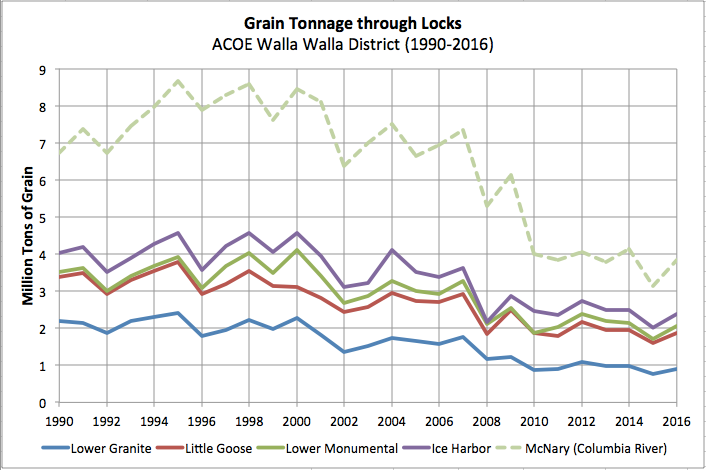forum
library
tutorial
contact

Judge's Order to Save Salmon
Won't Do the Job
by Editorial Board
Union Bulletin, October 19, 2018
|
the film forum library tutorial contact |

|
Judge's Order to Save Salmon
by Editorial Board
|
Those who filed a suit wanting water temperature lowered in the Columbia and Snake rivers
are declaring victory -- and seem to be looking to dam breaching.
 If wishes were fishes, the sea would be full.
If wishes were fishes, the sea would be full.
That little rhyme is something all of us have heard when someone is trying to make the point that simply wishing something to happen doesn't make it so.
Yet, a federal judge this week issued an order very close to wishing the sea would be full of fish.
U.S. District Judge Ricardo Martinez for the Western District at Seattle ordered protection for salmon from warm water temperatures in the Columbia and Snake river because they have been lethal to salmon and steelhead as the climate changes.
Unfortunately, some who look at this issue want to believe a clear solution exists -- such as breaching.
Seattle Times reporter Lynda V. Mapes noted recent efforts to remove Snake River dams.
"The ruling comes as the governor's task force on orca recovery is working on recommendations to help rebuild the critically endangered population of southern resident killer whales, which depend primarily on chinook for food. Orca advocates have joined forces with dam-removal advocates pushing to breach the Lower Snake River Dams to improve chinook runs," Mapes wrote.
Breaching dams is not a realistic option. This has already been studied and studied. It's clear tearing down the four Snake River dams would be a disaster for the Pacific Northwest. It would cut off irrigation in the Columbia Basin and end shipping grains and other goods on the rivers. It would add truck traffic, raise costs and boost air pollution.
(bluefish notes: shipping 2.5 million tons of grain will require 250 100-car trains. On average, this would amount to five trains per week. Union Pacific has previously stated that they have ample capacity for that shipment, but competing with the subsidized LSR dams has been an unprofitable exercise. See What are the Impacts to Transportation? for a more detailed discussion.)Attempting to establish a connection to the plight of the orcas with the Snake River dams seems to be rooted in rhetoric rather than science.
Martinez's 16-page ruling Wednesday ordered the U.S. Environmental Protection Agency to protect the fish from warm water. Mapes reported the ruling says climate change has exacerbated a long-standing problem with water temperature in reservoirs behind hydropower dams on the rivers, increasing the number of days in which temperatures exceed what can be tolerated by salmon and steelhead, which are cold-water species. Three years ago, 250,000 adult sockeye salmon died when the Columbia and Snake rivers became too warm.
The judge found the EPA did not enforce and ensure a temperature daily maximum as it is mandated to do under the Clean Water Act.
"Because of today's victory, EPA will finally write a comprehensive plan to deal with dams' impact on water temperature and salmon survival," said Brett Vandenheuvel, executive director of Columbia Riverkeeper, a plaintiff in the lawsuit.
Perhaps the EPA will write a comprehensive plan. And then what? A plan alone does zip.
This is a complex, ongoing problem that can't be solved by a report or a magic wand.
Yes, efforts must continue to save salmon. But the options have to consider the impacts on humans and the world we live in.
learn more on topics covered in the film
see the video
read the script
learn the songs
discussion forum
